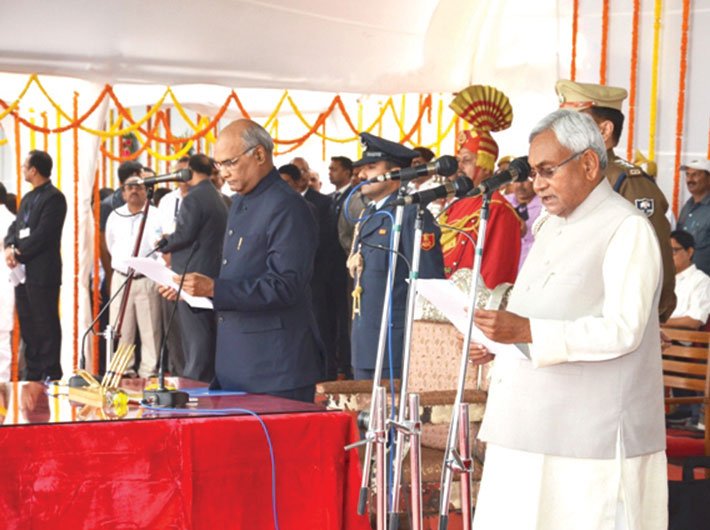Land reforms, social justice and countering the growing communalism will test the ‘giant killer’ CM
Despite prime minister Narendra Modi’s serious efforts, people of Bihar have once again shown full confidence in Nitish Kumar. He has emerged as a ‘giant killer’ and a new hope in the anti-BJP spectrum of Indian politics. Indicating his new status, anti-BJP leaders from various states were present when he took oath on November 20 for the fifth time. But after all the jubilations and bonhomie, it’s time to get back to governance. Here, Nitish should realise that expectations from him are soaring and there lies the challenge for him.
Nitish’s winning strategy was a cocktail of the slogan of development and caste and community combination. He focused on Yadavs, Muslims, Kurmis and some OBC groups to make a winning formula. BJP tried to polarise the society on communal lines to counter his arithmetic but failed. However, Nitish’s strategy has its limitations as in a long way, caste and identity politics could easily be appropriated by communal politics as stem from divisiveness.
Electoral victory alone cannot wipe out the dangers of communalisation. Communal tension in Vaishali and some other areas after the election results have proved that the ‘cow politics’ is still around. Senior journalist Urmilesh, a keen Bihar watcher for long, says, “Lalu and Nitish have won with the Mandal formula, but this cannot be a permanent solution. There is a need to challenge the communal politics on the ideological basis. A continuous mass campaign against communalism is very important, but only the left parties have shown some seriousness in this regard.” He blamed Nitish for BJP’s hold in Bihar. “We should not forget that socialists have given legitimacy to RSS. First Dr Ram Manohar Lohia and then Jayaprakash Narayan gave space to the Jan Sangh in the name of non-Congressism. Nitish too has worked very comfortably with BJP for a long time. He had never challenged RSS on the ideological basis,” he added.
CPI-ML (Liberation) is an old critic of Nitish. The left party, with a small but noticeable presence in the Bihar assembly for long, is known for regular mass movements and political actions against Nitish’s alleged ‘misrule’. It has maintained that Nitish has always worked in nexus with communal and feudal forces of Bihar. In the latest elections, for the first time, all the left parties joined hands, though only CPI-ML was successful, winning three seats. Party general secretary Dipankar Bhattacharya says, “election results in Bihar are not an endorsement of the Nitish government’s policies. The election was fought in the national context where the alliance became the primary vehicle. Now the united left of Bihar will hold the new government accountable.”
No doubt, even his opponents acknowledge that Nitish has done some good work over ten years and changed the picture of Bihar to an extent. Improvement in the law and order situation and increase in the growth rate are welcome achievements. Distribution of bicycles to girl students and remarkable improvement in electric supply has made him ‘Sushashan Babu’ but when he fought the Lok Sabha elections alone, he got only two seats. A shocked Nitish resigned as chief minister and finally regained power only after joining hands with Lalu Yadav.
Was it because the much-hyped development of Bihar could not fulfill the aspirations of the cross-sections of society? NK Chaudhary, retired principal of the prestigious Patna College, argues Nitish has failed in bringing about the much-awaited radical change in Bihar. “Land reforms in a semi-feudal state like Bihar were a must even for a capitalistic development. But Nitish has refused to do anything on the recommendations of the D Bandyopadhyay commission. His government has even disbanded the justice Amir Das commission which was probing the alleged links between politicians and the outlawed Ranvir Sena.”
This criticism has a point. The Bandyopadhyay commission on land reforms, which was appointed by Nitish in 2006, submitted its report in April 2008. It had proposed a new law to protect the state’s 5.84 lakh homeless bataidar (sharecroppers). It could have been a great leap forward but Nitish has finally declared that his government has no plans to pass the law which would protect the rights of the sharecroppers in the state. His government has also rejected the proposition of uniformity in land ceiling.
Bandyopadhyay, a bureaucrat credited with Operation Barga in West Bengal, has also criticised Nitish. In a statement in The Hindu on October 21, 2009 he said, “He has not made any attempt to even record the number of bataidars in Bihar. He has shown that he lacks courage when it came to implementing the bataidar law by developing cold feet and succumbing to the pressures of his party which mainly comprises upper castes.”
The great idea of a common school system was also thrown in the dustbin. After coming to power on November 24, 2005, Nitish constituted a Commission on Common School System headed by former foreign secretary Muchkund Dubey, which submitted its report in June 2008. A comprehensive nine-year action plan had been suggested to the government for achieving the goal of uniform education in the state. As per the recommendations, every school would have to enroll students of its adjoining localities without conducting any test or interview. But nothing has happened.
Chaudhary says, “The education system has collapsed in Bihar. Nitish has distributed bicycles [to put more girls in schools] but nothing has been done to improve the quality of education. A one-third of the faculty seats in colleges are vacant and 99% state universities are in a very poor condition. Lack of good technical education system is very frustrating for the new generation. Young Biharis are bound to migrate to Delhi or any other city.”
Part of the problem is the recruitment of ad-hoc primary teachers, called shiksha mitras, whose qualification and efficiency are in doubt. Village chiefs or panchayat mukhiyas had a major say in the recruitment and this obviously encouraged nepotism and corruption. A parallel, ‘private’ education system has flourished in the state due to the poor quality of education in government schools.
But Nitish’s biggest ‘sin’, according to critics, was to disband the justice Amir Das commission probing the alleged links between politicians and the outlawed Ranvir Sena. The commission was constituted by the RJD government soon after the December 1996 Laxmanpur-Bathe carnage in Jehanabad district in which 59 dalits had been gunned down by the Ranvir Sena, a private militia of landlords. Several accused were acquitted by the high court during the Nitish reign and his government did nothing.
CPI-ML’s Bhattacharya says, “Lalu has promised that this government will be ‘Mandal-II’. It should focus on land reforms and put an end to the sharecropping system. Victims of many caste massacres have suffered in the 10 years of Nitish government. Even insecurity of the Muslim youth should be dealt with. NIA [National investigation agency] teams have been raiding Bihar villages. We would like to know how the Nitish government will respond to it.”
BJP has already articulated the big challenge before Nitish: that Lalu and his two sons – who are now cabinet ministers – will be running the show and creating hurdles in Nitish’s path to good governance. The bigger challenge, however, would be to ensure land reforms, social justice and quality education – and effectively counter the communalisation that is growing deep roots

